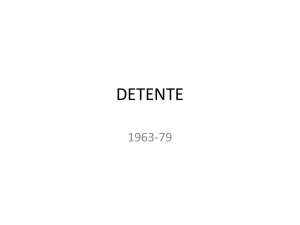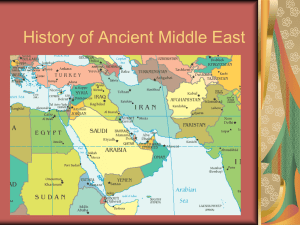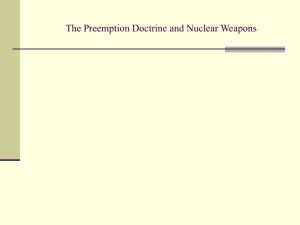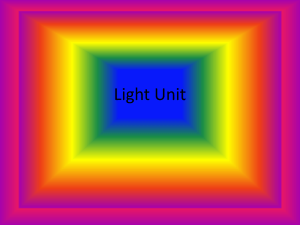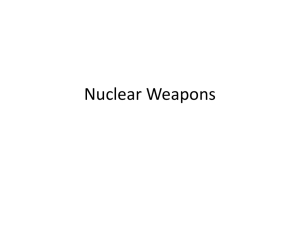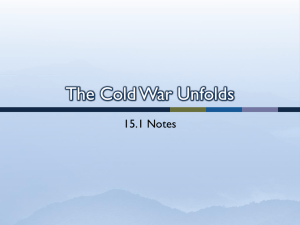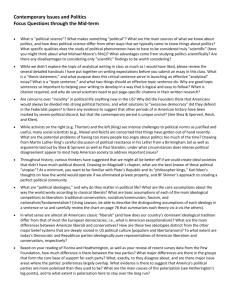Ten Steps toward the WMD-Free Zone in the Middle East
advertisement
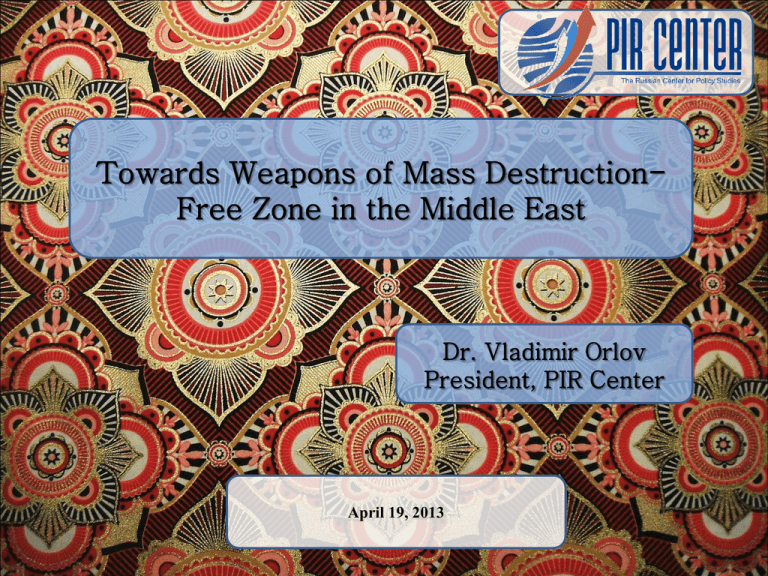
Towards Weapons of Mass DestructionFree Zone in the Middle East Dr. Vladimir Orlov President, PIR Center April 19, 2013 «Pursuant to consistent implementation of the Russian foreign policy course […] I hereby decree: the Ministry of Foreign Affairs of the Russian Federation, together with other federal executive bodies: […] are instructed to support the establishment in the Middle East of a zone free of weapons of mass destruction and means of their delivery». Russian Presidential Decree of May 7, 2012 «On measures to implement the Russian Federation's foreign policy course» PIR Center International Seminar: «2012 Conference on the Middle East Zone Free of Weapons of Mass Destruction – Searching for Solutions» October 4, 2012 With the participation of officials from Russian Foreign Ministry, Rosatom state corporation, think-tanks. Brought together representatives of Israel, Iran, Gulf states, Arab league, the USA, Russia. Ambassador Jaakko Laajava of Finland worked closely with all the relevant parties and the conveners. However the Conference scheduled for December, 2012 never took place. No future arrangements were made ahead of the 2nd PrepCom for the NPT Review Conference PIR Center brings solutions to get out of the deadlock and move toward a WMDFree Zone in the Middle East Nuclear Nonproliferation in the Middle East Other Weapons of Mass Destruction in the Middle East Ten Steps toward the WMD-Free Zone in the Middle East 1) All participants in the talks to establish a WMD-free zone should make joint statements in which they commit themselves to refrain from attacks (including cyberattacks), or threats of attacks, against each other’s declared nuclear facilities placed under IAEA Safeguards. Ten Steps toward the WMD-Free Zone in the Middle East 2) As part of the negotiations, the participants should draw a Road Map for gradually placing all nuclear infrastructure facilities in the region under the IAEA safeguards. Ten Steps toward the WMD-Free Zone in the Middle East 3) During the talks, all the states in the region should reach an understanding on the need to ratify without any further delay the Additional Protocol to the IAEA Safeguards Agreement. Signed and ratified: Bahrain, Jordan, Kuwait, Libya, Mauritania, Morocco, Qatar, UAE, Yemen Signed but not ratified: Iran, Iraq, Tunisia Not signed: Egypt, Israel, Lebanon, Oman, Saudi Arabia, Sudan, Syria Ten Steps toward the WMD-Free Zone in the Middle East 4) Standing regional mechanism for confidence building measures with regard to nuclear programs, as well as chemical and biological weapons and some types of delivery systems. Chemical Weapons Convention not in force: Egypt, Israel, Syria Biological and Toxin Weapons Convention not in force: Egypt, Israel, Mauritania, Syria Geneva Protocol not in force: Mauritania, Oman, UEA Ten Steps toward the WMD-Free Zone in the Middle East 5) Participation of all the Middle Eastern states in the Comprehensive Nuclear Test Ban Treaty should be a precondition for signing a treaty establishing a WMD-free zone in the region. CTBT Annex 4 states in the Middle East: Egypt, Iran and Israel. CTBT signed but not ratified: Egypt, Iran, Iraq, Yemen CTBT not signed: Israel, Saudi Arabia, Syria Ten Steps toward the WMD-Free Zone in the Middle East 6) Signing agreements to ban certain types of missiles would help build confidence and establish verification mechanisms in the region. Missile class Range, km Examples in the region in 2012 Short-range 500-1,000 Shahab-2 (Iran) Medium-range 1,000-3,500 Jericho-2 (Israel), Shahab-3 (Iran), DongFeng 3A (Saudi Arabia) Intermediaterange and ICBMs Over 3,500 None Ten Steps toward the WMD-Free Zone in the Middle East 7) Internationalizing/regionalizing the nuclear fuel cycle Examples to follow: Eurodif URENCO The International Uranium Enrichment Center Ten Steps toward the WMD-Free Zone in the Middle East 8) Institutional nuclear cooperation in the Middle East through the creation of a universal body which would include every country in the region. Integration projects in the nuclear energy sector of the Middle East: The Arab Atomic Energy Agency (AAEA) The Gulf Cooperation Council (GCC) Ten Steps toward the WMD-Free Zone in the Middle East 9) Reliable mechanisms for early warning in the event of a nuclear accident Bushehr Iran Akkuyu Turkey ? UAE Barakah Sinop Jordan Khirbet Al Samra Ten Steps toward the WMD-Free Zone in the Middle East 10) Decision to set up an intergovernmental commission to draft the text of the treaty establishing a WMD-free zone in the Middle East. This should be done with the understanding that during the work on the text of the treaty all countries in the region will join the Chemical Weapons Convention (CWC) and the Biological and Toxin Weapons Convention (BTWC). The treaty should also establish verification mechanisms. 10steps.eng.pircenter.org 10steps.pircenter.org To get free full access to the Security Index journal 2011-2012 archive for 14 days follow three simple steps: 1) Log in/register at the www.tandfonline.com 2) Follow the link to activate your 14 days access www.tandfonline.com/r/PoliticsIR 3) Explore the journal at www.tandfonline.com/loi/rsec20


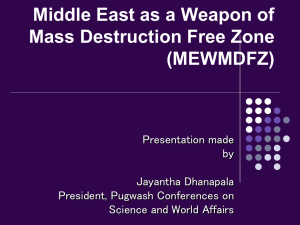
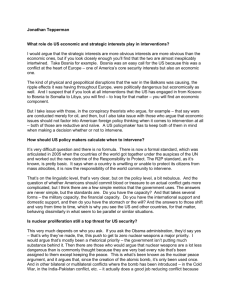

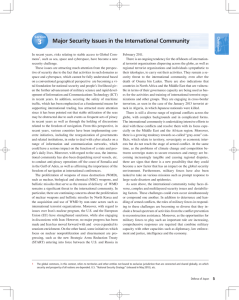
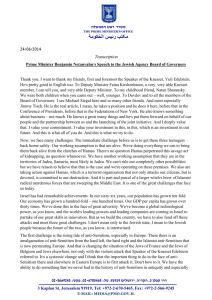
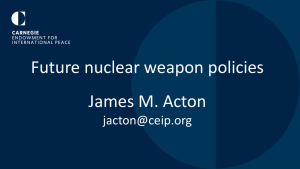
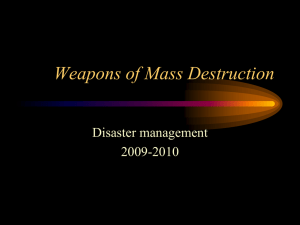
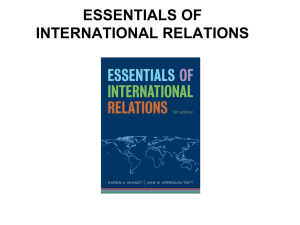
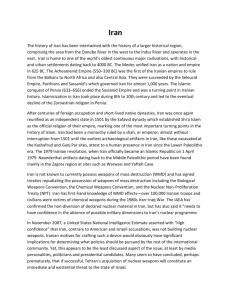
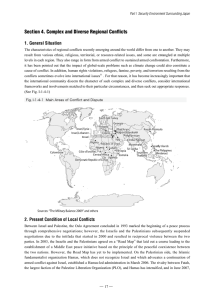
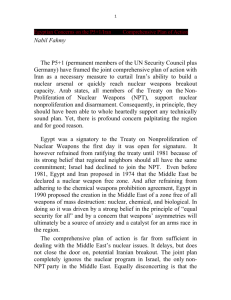

![The Politics of Protest [week 3]](http://s2.studylib.net/store/data/005229111_1-9491ac8e8d24cc184a2c9020ba192c97-300x300.png)
